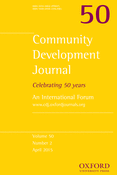-
Views
-
Cite
Cite
Lorena M. Ibargüen-Tinley, Social capital development in a rural women's micro-enterprise in Mexico: insights on leadership, trust and cooperation, Community Development Journal, Volume 50, Issue 2, April 2015, Pages 229–243, https://doi.org/10.1093/cdj/bsu038
Close - Share Icon Share
Abstract
For a number of years, rural women micro-enterprise projects and policies have been formulated to take advantage of the strong cohesion and solidarity among groups of women in order to improve their development opportunities. This article explores some of the factors that may affect women's social capital development, such as the capacity for trust and cooperation, through the example of a case study of a women's micro-enterprise in rural Mexico. The analysis focused on three aspects that conform the social bases of trust: the existence of rules and norms, experience arising from repeated interactions and the characteristics of the members of the group. Issues of leadership, social identity, and solidarity among the group of women are highlighted. Contradictions arise with two objectives believed to complement each other: the development of women's social capital (relationships based on trust, social cohesion and solidarity) and the aim to make money to provide income opportunities for rural women in marginalized situations. The article concludes that the main factor, which influenced the creation of social capital and therefore the capacity for cooperation among the group was the personal characteristics of the group's leader.



